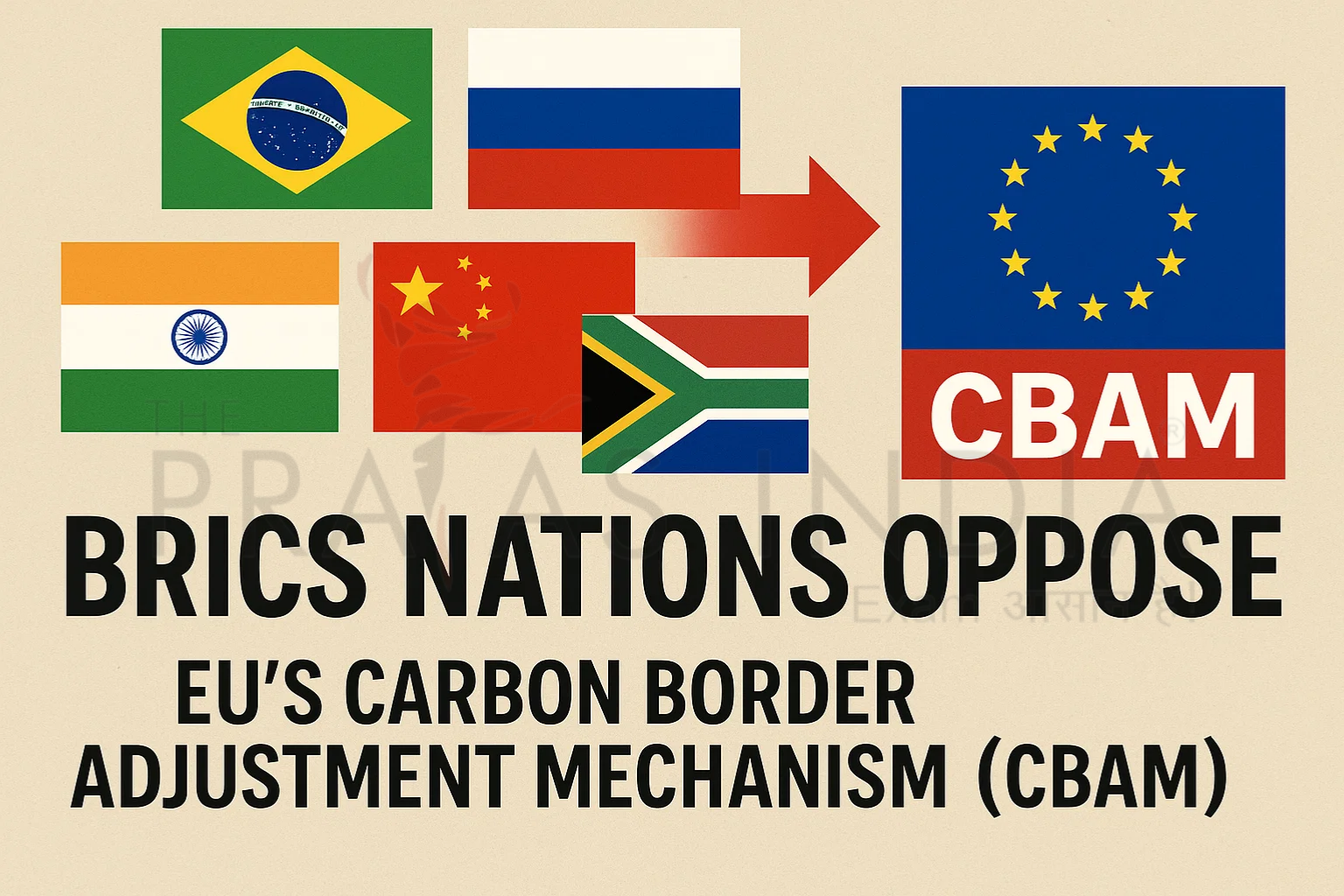BRICS Rejects EU Carbon Border Tax | Climate Justice vs Trade Policy
In July 2025, the BRICS countries—Brazil, Russia, India, China, and South Africa—formally rejected the European Union’s Carbon Border Adjustment Mechanism (CBAM), citing concerns over economic fairness, trade discrimination, and climate equity. The unified opposition reflects a growing North-South divide on climate responsibilities and international trade practices.
This development holds significant implications for global climate diplomacy, international trade norms, and the ongoing conversation on equitable climate transition. For competitive exam aspirants, especially those preparing for UPSC, SSC, and Banking, this issue touches upon important areas such as international relations, environmental governance, global trade, and sustainable development.

What Is the EU Carbon Border Adjustment Mechanism (CBAM)?
The CBAM is a European Union climate policy that aims to prevent “carbon leakage”—a phenomenon where EU companies move production to countries with less strict carbon emission standards. Under CBAM, the EU imposes a carbon tax on imported goods such as steel, cement, aluminum, electricity, fertilizers, and hydrogen, based on their carbon intensity.
The mechanism officially entered its transitional phase in October 2023, with full implementation scheduled for January 2026. During the transitional period, importers must report carbon emissions associated with their goods but are not yet required to pay the financial levy.
Why Are BRICS Nations Opposing CBAM?
-
Trade Discrimination:
BRICS countries argue that CBAM acts as a trade barrier disguised as a climate policy. By taxing imports based on carbon emissions, the EU is seen as undermining the competitiveness of developing economies whose industries are still dependent on fossil fuels. -
Violation of Climate Equity:
The principle of Common But Differentiated Responsibilities (CBDR) under the UNFCCC recognizes that developed nations bear a historical responsibility for climate change. BRICS countries assert that CBAM violates this principle by penalizing developing countries while ignoring the historical emissions of developed economies. -
Impact on Developing Economies:
CBAM could significantly impact BRICS exports, especially in energy-intensive sectors like steel, aluminum, and cement. India and China have expressed concerns that such unilateral measures will hurt small and medium enterprises (SMEs) and stall industrial growth. -
Lack of Global Consensus:
BRICS nations stress the need for multilateral dialogue through institutions like the UNFCCC or World Trade Organization (WTO), rather than unilateral imposition of climate-related trade measures by developed regions.
India’s Stand on CBAM
India has consistently opposed CBAM since its proposal in 2021. As one of the largest exporters of carbon-intensive goods, India views CBAM as protectionist and unjust. The government has raised this issue in international forums including G20, WTO, and climate negotiations.
India’s key concerns include:
-
Impact on export competitiveness
-
Burden on domestic manufacturers
-
Disruption of supply chains
-
Erosion of trust in global climate cooperation
To counter the CBAM, India has initiated policy measures like enhancing domestic carbon accounting frameworks, exploring carbon pricing mechanisms, and boosting renewable energy adoption across sectors.
Reactions from Other BRICS Members
-
China: Called CBAM a breach of WTO rules and emphasized its domestic carbon trading system as a valid alternative.
-
Russia: Criticized CBAM as politically motivated and economically coercive.
-
Brazil and South Africa: Urged the EU to consider the developmental priorities and financial constraints of the Global South.
Global Trade and Climate Diplomacy at Crossroads
This dispute over CBAM signals a shift in the global discourse on climate action. The challenge now lies in reconciling environmental goals with developmental needs and trade fairness. While the EU argues that CBAM incentivizes greener production, BRICS nations see it as a tool that reinforces economic inequality under the guise of environmentalism.
The rejection of CBAM by BRICS highlights:
-
The urgent need for inclusive climate governance
-
The relevance of climate justice in trade policy
-
The role of developing economies in shaping global environmental standards
Implications for Competitive Exams
UPSC (GS-II, GS-III & Essay):
- International Relations: BRICS cooperation, WTO, EU foreign policy
- Environment: Climate agreements, carbon trading, green finance
- Essay: Balancing trade and climate responsibility in a globalized world
SSC & Banking:
- Current Affairs: July 2025 events
- Static GK: BRICS, EU, climate policy
- Economy: Carbon taxation, global trade developments
Conclusion
The BRICS bloc’s rejection of the EU’s CBAM marks a critical moment in international climate and trade policy. It emphasizes the need for equitable solutions that respect the developmental needs of emerging economies while addressing global climate goals. As the world moves toward a greener future, policies like CBAM must be designed through consensus, not compulsion.
For aspirants of competitive exams, this issue is not only a key topic in current affairs but also a lens through which broader themes of climate justice, global governance, and economic diplomacy can be understood.




![Prayas-तेजस [UPSC CSE Sociology Optional] – Online & Offline](https://theprayasindia.com/wp-content/uploads/2025/09/Prayas-तेजस-UPSC-CSE-Optional-Subject-The-Prayas-India-300x300.png)
![Prayas-सूत्र [UPSC CSE Materials (Hardcopy)]](https://theprayasindia.com/wp-content/uploads/2025/09/Prayas-सूत्र-UPSC-CSE-Study-Materials-Hardcopy-The-Prayas-India-300x300.png)
![Prayas-मंत्रा [UPSC CSE CSAT]](https://theprayasindia.com/wp-content/uploads/2025/09/Prayas-मंत्रा-UPSC-CSE-CSAT-The-Prayas-India-300x300.png)
![Prayas सारथी [UPSC CSE One on One Mentorship]](https://theprayasindia.com/wp-content/uploads/2025/09/Prayas-सारथी-UPSC-CSE-One-on-One-Mentorship-The-Prayas-India-300x300.png)










